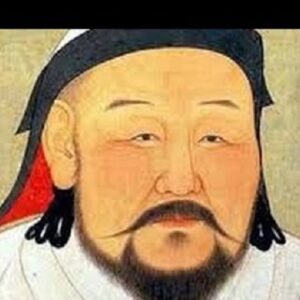Kublai Khan was a Mongol emperor who established the Yuan or Mongol dynasty in Mongolia and China, and was the first emperor to rule the empire from 1260 to 1294. After his illustrious grandfather, Genghis Khan, he is regarded as the greatest of the Mongol monarchs. As the Mongol dynasty’s emperor, he was also the ruler of all Mongol dominions, which included parts of southern Russia and Persia. He was the first non-Han Emperor to conquer all of China, but his real power was limited to China and Mongolia. Kublai Khan was recognized for his tolerance of many religions, and he reformed the government by forming three independent divisions to deal with civilian issues, control the military, and keep a check on the country’s top leaders. He was a strong supporter of trade, science, and the arts, and he pioneered the use of paper money in his empire to ease trade transactions. He built efficient transportation infrastructure throughout the kingdom and ordered the establishment of a new Mongol alphabet. He was a well-liked emperor who ruled for more than three decades, during which time he built a massive, prosperous empire. In 1294, he died, signaling the end of an important period in Chinese history.
Childhood and Adolescence
On September 23, 1215, he was born. Tolui and Sorghaghtani Beki were his parents. Genghis Khan, the founder and ruler of the Mongol Empire, was his grandpa. Kublai’s mother chose a Buddhist Tangut woman as her son’s nurse at Genghis Khan’s request.
He was drawn to modern Chinese culture in his early years and asked Haiyun, the leading Buddhist monk in North China, to Mongolia to teach him Buddhist doctrine.
Reign & Accession
Following the Mongol-Jin War in 1236, Kublai was given his own land, which contained 10,000 families. Due to his inexperience, he allowed local authorities to run amok, resulting in widespread corruption. He promptly instituted changes to bring the state’s affairs into order.
In 1251, his elder brother Mongke was appointed Great Khan of the Mongol Empire, and Kublai was granted authority of the empire’s eastern Chinese lands. He gathered a cadre of Chinese consultants to help him implement reforms in his lands.
He was also tasked with uniting China under the Mongol rule. In 1258, Mongke appointed him commander of the Eastern Army and ordered him to help with an attack on Sichuan. Mongke, on the other hand, was slain in 1259 while heading an expedition into Western China, and Kublai was elected as Mongke’s successor in 1260.
Ariq Boke, his younger brother, recruited troops to challenge Kublai for the throne, and the brothers’ conflict resulted in the destruction of the Mongolian capital at Karakorum. Ariq Boke finally surrendered to Kublai in 1264, after a long and harsh conflict between the two.
The government was reorganized under Kublai Khan’s leadership, and a new capital city was built in 1267 in what is now Peking, China. His reign was marked by political instability and invasion threats in the early years, but he quickly consolidated his empire.
He was especially well-known for his tolerance of all religions. He fostered science, art, and trade, which helped his empire grow economically, scientifically, and culturally. He concentrated on constructing efficient infrastructure and transportation networks, garnering the trust and respect of his people.
He concentrated on expanding his kingdom after strengthening his governance in northern China. He went on multiple expeditions, conquering wide swaths of terrain, notably Xiangyang, which he took after the decisive Battle of Xiangyang. He established his own dynasty under the name Da Yuan, or Great Origin, in 1271. He eventually took control of Hangzhou, China’s wealthiest city.
After 1279, his government began to face financial difficulties, and his future expeditions were no longer as successful as his previous ones. All of his invasions, including those of Japan, Annam, Champa, and Java, were a failure. Extreme environmental conditions, mismanagement of funds, and disease afflicted most of his subsequent efforts. During his later years, Kublai Khan lost a lot of his glory.
Achievement of Major Importance
Kublai Khan established the Great Yuan Great Mongol State, generally known as the Mongol or Yuan dynasty, in 1271, with a traditional Chinese proclamation. The Yuan dynasty was the first foreign monarchy to rule over all of China, and its influence extended throughout most of Asia and Eastern Europe.
Personal History and Legacy
Tegulen was his first wife, but she died tragically young. He then married Khunggirat princess Chabi Khatun, who became his favorite empress.
In 1281, Chabi died, and Kublai married Nambui, Chabi’s younger cousin.Dorji, the director of the Secretariat and head of the Bureau of Military Affairs in 1263, was one of his many offspring. Zhenjin, whose son Temur Khan succeeded Kublai, was another of his children. Nomukhan, Khungjil, Aychi, Saqulghachi, Qughchu, and Toghan were among his other children.
His last years were terrible, as he mourned the loss of both his wife and son. In search of solace, he turned to food and alcohol, overindulging in both. He got heavy and suffered from a variety of ailments, including gout and diabetes. When no physician could cure his ailments, he became depressed and died on February 18, 1294, at the age of 78.
The poem ‘Kubla Khan,’ written in October 1797 by English Romantic poet Samuel Taylor Coleridge, is about Kublai Khan.
Kublai Khan Net Worth
Kublai Khan estimated net worth is about $6 MILLION (2022).


